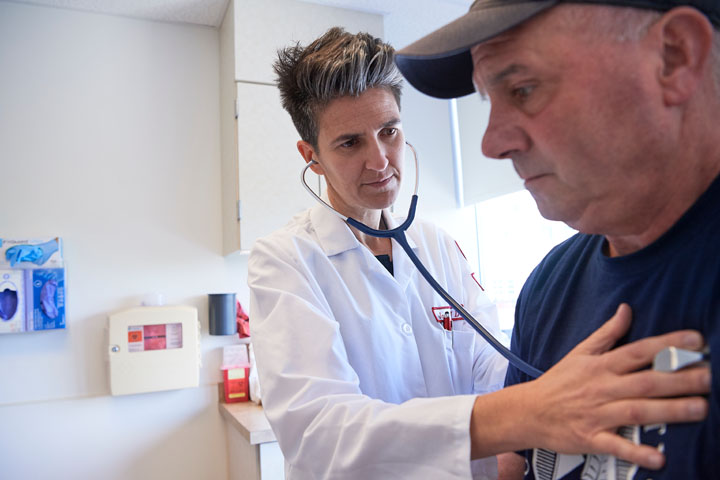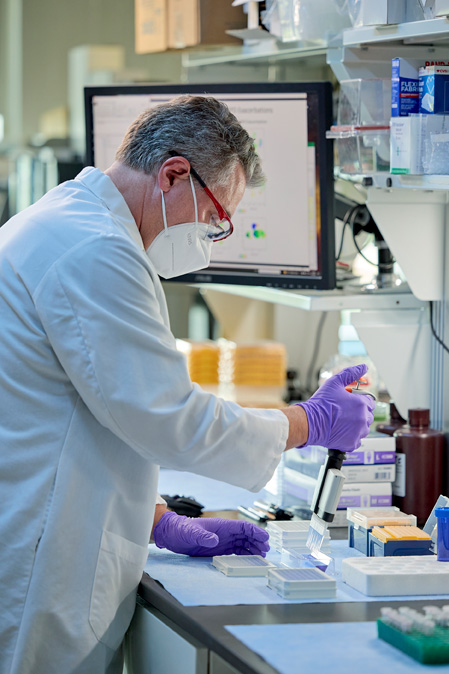As the country’s leading referral destination for lung transplantation, the Temple Lung Center has established a reputation for taking on the most complex cases — frequently transplanting patients who find themselves outside standard eligibility criteria. And while performing transplants for challenging cases — including higher age or BMI, or concurrent health conditions – may present challenges for other centers, Temple consistently surpasses national benchmarks in patient outcomes.
With internationally renowned surgeons like Dr. Yoshiya Toyoda, who pioneered the antero-axillary approach to transplantation, Temple’s transplant team is well-equipped to handle a wide range of transplant cases.
As the country’s leading referral destination for lung transplantation, the Temple Lung Center has established a reputation for taking on the most complex cases — frequently transplanting patients who find themselves outside standard eligibility criteria. And while performing transplants for challenging cases — including higher age or BMI, or concurrent health conditions – may present challenges for other centers, Temple consistently surpasses national benchmarks in patient outcomes.
With internationally renowned surgeons like Dr. Yoshiya Toyoda, who pioneered the antero-axillary approach to transplantation, Temple’s transplant team is well-equipped to handle a wide range of transplant cases.

Temple’s multidisciplinary approach to transplantation uniquely positions the highly collaborative team of subspecialists to take on challenging cases involving high-risk patients, those who have previously been turned down by other centers, or those in need of retransplantation. With a focus on research advancements and applied innovations, members of the team frequently employ breakthrough techniques and advance the standard of care well past typical patient protocols.
Temple provides lung transplantation for patients with chronic, end-stage lung diseases who have failed maximal medical therapy. The most common diagnostic indicators are interstitial lung disease (ILD), including idiopathic pulmonary fibrosis (IPF), COPD and advanced emphysema, pulmonary hypertension, and cystic fibrosis.
For patients who face lower survival rates, lung transplantation offers an opportunity to extend and expand their quality of life. For example, in adults with IPF who are 65 and older, median survival (nationally) is 3.8 years from time of diagnosis without medical treatment. Post transplant, these patients do markedly better, with one-year survival at 85.3%; three-year survival at 67%; five-year at 54.3%; and 10-year at 32.8%, based on national statistics. Comparatively, Temple routinely performs better than the national average post-transplant survival rates at 90.27% for one-year survival post-transplant and 78.6% for three-year survival post-transplant.
This comprehensive transplant team collaborates closely to manage the medical and surgical aspects of lung transplantation, and follow up care from dedicated specialists ensures successful recovery and improved patient outcomes.
Current research focuses on preservation of donated organs, immunosuppressive medications, antibiotic use, echocardiographic evaluation of patients, alternative therapies for wait-listed patients, and minimally invasive therapies. Temple’s lung transplant program performs coronary artery bypass graft surgery (CABG) concurrent with transplant when needed, a specialty procedure unique to the Temple Lung Center given its complexity. Temple offers the option of extracorporeal membrane oxygenation (ECMO) to give patients in danger of imminent death time to be evaluated. The Temple Lung Center was the first hospital in Pennsylvania to perform lung transplantation using the TransMedics Organ Care System, a technology that keeps donor lungs functioning during transport.

Temple Lung Center consultations are available for any patient interested in pursuing a lung transplant or a second opinion. To refer a patient, complete our online referral form or call 800-TEMPLE-MED.
Please complete the following form and a representative from the Temple Lung Center will contact you to schedule an appointment for your patient. If you have any questions, please call us at 800-TEMPLE-MED.
Fields marked with * must be completed.
Disclaimer: Temple University Health System (TUHS) neither provides nor controls the provision of health care. All health care is provided by its member organizations or independent health care providers affiliated with TUHS member organizations. Each TUHS member organization is owned and operated pursuant to its governing documents. Temple Health refers to the health, education and research activities carried out by the affiliates of Temple University Health System and by the Lewis Katz School of Medicine.